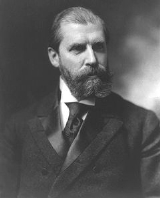
Charles Evans Hughes, Sr. (April 11, 1862 – August 27, 1948) was an American statesman, lawyer and Republican politician from New York. He served as the 36th Governor of New York (1907–1910), Associate Justice of the Supreme Court of the United States
(1910–1916), United States Secretary of State
(1921–1925), a judge on the Court of International Justice
(1928–1930), and the 11th Chief Justice of the United States
(1930–1941). He was the Republican candidate in the 1916 U.S. Presidential election
, losing narrowly to Woodrow Wilson
.
Hughes was a professor in the 1890s, an important leader of the progressive movement of the 1900s, a leading diplomat and New York lawyer in the days of Harding and Coolidge, and a leader of opposition to the New Deal
in the 1930s.
We are under a Constitution, but the Constitution is what the judges say it is, and the judiciary is the safeguard of our liberty and of our property under the Constitution.![]()
While democracy must have its organizations and controls, its vital breath is individual liberty.![]()
A man has to live with himself, and he should see to it that he always has good company.![]()
When we lose the right to be different, we lose the privilege to be free.![]()
The power of administrative bodies to make finding of fact which may be treated as conclusive, if there is evidence both ways, is a power of enormous consequence. An unscrupulous administrator might be tempted to say "Let me find the facts for the people of my country, and I care little who lays down the general principles."![]()
At the constitutional level where we work, ninety percent of any decision is emotional. The rational part of us supplies the reasons for supporting our predilections. ![]()

